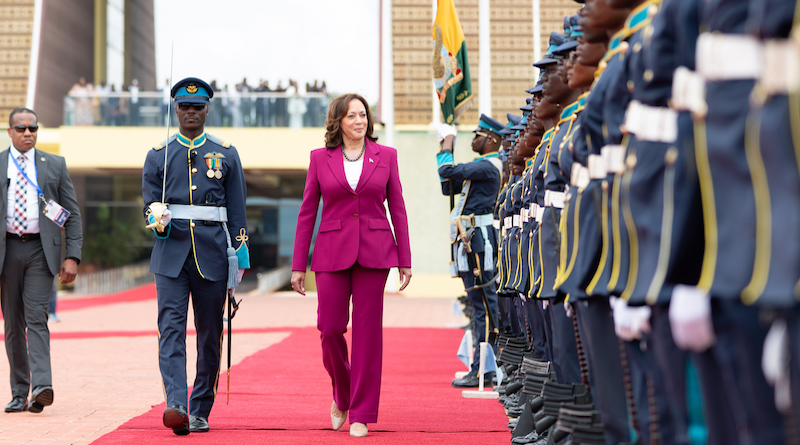Kamala Harris Joins The Pilgrimage To Africa – Analysis
By ISS
By Peter Fabricius*
As Russia’s war against Ukraine drags on, so international interest in Africa seems to increase – certainly from the United States (US). That is a difficult measure of course, because President Joe Biden’s predecessor Donald Trump was beyond uninterested in Africa. But even without the Ukraine war, a resurgence was on the cards when Biden was elected.
The US-Africa summit in December 2022 – the first in six years – committed Washington to devote time and attention to Africa. Vice-President Kamala Harris completed a three-nation trip to Ghana, Tanzania and Zambia earlier this month, and Biden’s first presidential visit to the continent is due later this year. First Lady Jill Biden and Secretary of State Antony Blinken preceded Harris to Africa, and other officials, like Treasury Secretary Janet Yellen, have also been.
Though the menace of Russia appears to have partly inspired this procession of US visits, the rivalry with Beijing rather than Moscow seems to be receiving the most attention.
The US Institute of Peace’s Thomas Sheehy conjectured that the visits were largely due to Washington’s belated realisation that the US had rather ignored Africa for the past couple of decades while China raced ahead. Sheehy noted that when the US Congress passed the African Growth and Opportunity Act in 2000, the US was Africa’s largest trading partner. Now China was in front.
Sheehy said Africa ‘wants choice’ and doesn’t want to be forced to opt for one side or the other. And indeed, that menu of relations now includes a whole host of new players from the Gulf States, the Middle East, and Europe.
The West – or at least the US – still perceives China as its principal rival, certainly in Africa
Perhaps the high drama of the Ukraine war and activities of the Russian private military company Wagner in Ukraine and Africa has blinded us to the reality that the West – or at least the US – still perceives China as its principal rival, certainly in Africa.
It was no doubt important that two of the three countries Harris visited, Ghana and Zambia, have largely been voting with the US, the West and most other countries to condemn Russia’s invasion of Ukraine in the United Nations General Assembly. But other factors, such as debt restructuring, clearly shaped the itinerary. Both Zambia and Ghana have recently defaulted on massive debts, becoming test cases in the new G20 Common Framework approach for restructuring for poor countries.
Harris’ trip was also likely about access to minerals and reducing China’s considerable lead in accumulating strategic minerals, including for countering climate change.
Zambia appeared to be the centrepiece of the visit, as it has become the ‘new US darling in Africa’ as Africa Report put it. This is partly because of President Hakainde Hichilema’s revival of democracy – for which he was chosen as the African co-host of Biden’s second democracy summit last month. Other factors, such as strengthening military ties and making Zambia more business-friendly, also played a role.
Harris said that in her meetings with the presidents of all three countries, she emphasised the importance of democracy and good governance. Indeed, Ghana has become one of Africa’s most stable and consistent democracies. Tanzania and Zambia are essentially recovering democracies.
Harris emphasised democracy and good governance in meetings with presidents of all three countries
Tanzania’s Samia Suluhu Hassan is reversing the autocratic tendencies of her predecessor John Magufuli. And Hichilema is doing much the same to the legacy of Edgar Lungu. It is not just a question of promoting democracy and good governance for their own sake. As Harris said, ‘Freedom of the press, that rule of law, human rights – these will be issues for Americans in terms of shareholders or consumers.’ She also stressed women’s empowerment, the importance of digital inclusion and tackling climate change.
The emphasis on democracy and good governance contrasts with China’s unconditional support. Many African leaders – generally undemocratic ones, unsurprisingly – prefer Beijing’s no-strings-attached approach. But the US has little choice given its constituency, and this does help distinguish it from China.
Just a few years ago, one of America’s major counters to China’s overwhelming investment in African infrastructure was to argue that China was pursuing ‘debt trap diplomacy’. This approach plunged African countries into irredeemable debt, even forcing them to mortgage the assets it was financing.
Promoting democracy is part of a cluster of US interests that mostly include competition with China
There was a hint of that argument from Harris in Lusaka when she urged bilateral creditors ‘to provide meaningful debt reduction to Zambia’ after being asked what the US was doing to push China – Zambia’s largest bilateral creditor – to restructure Zambia’s debt.
But the debt trap argument has been losing some of its force lately. This is partly because the G20’s Debt Service Suspension Initiative (DSSI), created to help indebted countries cope with the impact of COVID-19, brought China into the Western debt restructuring system.
Deborah Bräutigam and Yufang Huang of the China Africa Research Initiative said in a report this month: ‘The DSSI succeeded in providing a pathway for China, the world’s largest bilateral creditor, to negotiate debt treatments together with the Paris Club in the context of [International Monetary Fund] balance of payments assistance. Getting Chinese commitment to join was “miraculous” as one G20 participant put it. Yet much remains to be done.’
Despite this convergence, America’s rivalry with China grows ever stronger, partly reinforced by suspicions that Beijing might provide military support to Russia in its war against Ukraine. Promoting democracy and good governance remain important US aims in Africa, though part of a much wider cluster of interests that mostly include competition with China.
*About the author: Peter Fabricius, Consultant, ISS Pretoria
Source: This article was published by ISS Today

